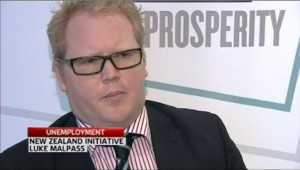Selling off Lotto
Last week a lucky Lotto player won $27 million. All the attention the game has been receiving recently makes this a good time to ask why it is still run by the state? Read more

Last week a lucky Lotto player won $27 million. All the attention the game has been receiving recently makes this a good time to ask why it is still run by the state? Read more
When Germany’s Constitutional Court cleared the path for the European Stability Mechanism and the Fiscal Compact, markets and governments joined in a collective sigh of relief. With the last legal hurdle cleared, the €700 billion fund to stabilise Europe’s monetary union, rescue over-indebted governments and struggling banks could be established and the euro saved. Read more
For the past two weeks, I have been attending conferences in Europe. Following the general meeting of the Mont Pelerin Society in Prague, I spoke at the European Resource Bank in Brussels. Read more
New Zealanders often face calls for an Australian-style compulsory superannuation scheme that would expand Kiwisaver by making it compulsory. This is a multi-faceted issue and is worth reflecting on, particularly the political economy aspect. Read more
Visitors to the EU quarter in Brussels are currently greeted by a giant poster on the faade of the Berlaymont building, the EU’s head office. Proclaiming more economic and political union for the EU, it stands in marked contrast to the constant signs of disunion and conflict on display across Europe. Read more
An economist ponders the deep questions. Being an economist is tough. Read more
In its recently released Building Innovation progress report, the government rightly recognises that innovation is critical for improving New Zealand’s global competitiveness. Unfortunately, innovation remains the country’s weakest area, according to the Global Competitiveness Report 2012–13 released this week by the World Economic Forum (WEF). Read more
When the government announced recently that it intended to lift exports from 30% to 40% of GDP by 2025, it was difficult not to roll your eyes. It was just another in a long series of targets whose utility was not explained, is unlikely to be reached, and doesn’t address underlying economic issues. Read more
I am in Prague attending the general meeting of the Mont Pelerin Society, a network of distinguished liberal academics and intellectuals. One of the best speeches at the conference, however, was delivered by a businessman with no academic affiliation – and contained an implicit warning to countries like New Zealand. Read more

Founded in 1947 by distinguished economists such as Friedrich Hayek, Milton Friedman and Ludwig von Mises, the Mont Pelerin Society has long been a forum for critics of big government, defenders of the free market and believers in individual liberty. As the society’s general meeting in currently being held in Prague (hosted by Vaclav Klaus, the fiercely euro sceptical Czech president), it was clear that the euro crisis would be a dominant theme during the week-long conference. Read more
There is a great myth that New Zealand is open for business and is a very easy place for anyone to invest. Little could be further from the truth – according to the OECD, New Zealand is actually performing very poorly compared to other countries in the race to attract overseas capital. Read more
US Secretary of State Hillary Clinton jets into Rarotonga today to attend the Post-Forum Dialogue of the 43rd Pacific Islands Forum. The leaders of the 15 countries attending the forum – including Prime Minister John Key and Australian Prime Minister Julia Gillard – have been discussing a number of environmental, security and economic issues, with a particular focus on renewable energy, development assistance, and climate change. Read more
Last week, I attended an annual public policy conference organised by the Australian think tank The Centre for Independent Studies on topics that ranged from foreign affairs to global economics. However, one of the sessions – traditionally reserved for the latest developments in science and engineering – was most humbling, particularly for the economists attending. Read more
Click image for larger view.
Read more